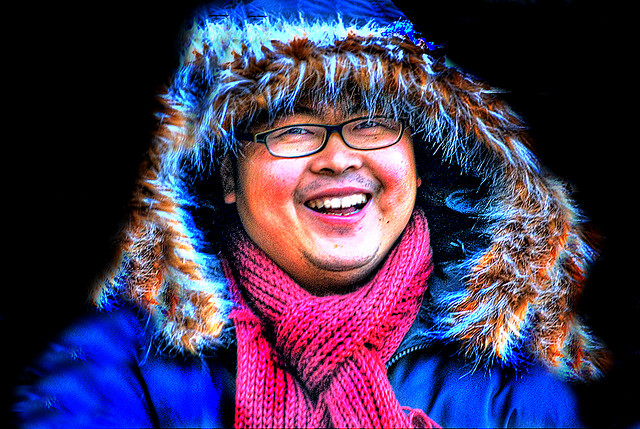
“The place to be happy is here. The time to be happy is now.” ~Robert G. Ingersoll
In The Four Noble Truths, the Dalai Lama wrote, “It is a fact—a natural fact of life—that each one of us has an innate desire to seek happiness and to overcome suffering.”
Regardless of religion or creed or upbringing, I think we can all agree on this most universal of statements. Underneath whatever personalities we project and whatever lives we lead lies a foundational truth that applies to all of us: We want to be happy; we don’t want to suffer.
So what can we do now, today, to feel happier? Before I describe specific practices, let me explain how I view change and self-improvement. As the old saying goes, there are two sides to a coin, and this positive-negative duality applies just as much here.
For example, “we want to be happy” is the positive side of the statement above, or what to do, and “we don’t want to suffer” is the negative, or what not to do.
Any challenge, whether it’s becoming a happier you or dropping a bad habit, gets much easier and gives more lasting results if you focus on the positive aspect of the situation (what you should do) as opposed to the negative (what you shouldn’t do).
Focusing on the positive creates a set of habits that ultimately lead to a better lifestyle, built by you and around your goals.
The negative path enforces rules and boundaries that ultimately lead to internal mental resistance and a diminished self-esteem. This realization made all the difference in my pursuit of happiness.
What You Can Do Today
Before this insight, I would spend my days trying to figure out what situations to avoid, what habits to control, where to go or whom to see for happiness. After the shift in my thinking, I began asking myself what I should do specifically to live a happier life.
Much trial and error, many years, and many books later, I uncovered three main conditions under which a person feels truly happy: appreciation of the present moment, hope of future achievement, and service to others.
These conditions are quite different and imply, in my opinion, different forms of happiness. Some individuals will naturally gravitate toward one or two out of three, or even just one. That’s normal.
If you can handle all three, go for it. If not, don’t worry. Alone or combined, they all make for a dramatic improvement in quality of life and awaken a happier you.
1. Appreciation of the present moment
At its highest level, this means to become intensely focused on the present and, in some cases, to suspend time entirely. If you can do this, great. But not all of us are masters at entering the now. For most of us, leading a lifestyle of gratitude is the best and most practical way to cultivate appreciation for the present moment.
A fail-proof technique I found was to reflect at the end of each day and express written gratitude for one to three things, events, or whatever I felt grateful for.
Doing this daily brings about a shift in mentality from “what’s lacking in my life?” to “what is here before me now?” until being grateful eventually becomes second nature. If on certain days you truly can’t find anything worth being grateful for, don’t force yourself.
That said, there is no shortage of things for which we can be grateful. At the very least you can breathe, and you likely have somewhere to sleep, can see and read this article, and have food to sustain you. Those are all things to be grateful for. Imagine life without them.
2. Hope of future achievement
The second condition, hope for future achievement, implies a different, more worldly sort of happiness. This does not always mean monetary gain, although that is usually a product of achievements such as business expansion, securing a job, or earning a promotion. This type of success, within reason, is normal. Our biological need to survive compels us to pursue it.
But achievement comes in many other forms. It can mean physical feats such as finishing a triathlon, or a personal journey of self-enlightenment, or even little things like becoming more organized and driven.
All of these endeavors give us end goals to surpass and offer us the promise of due reward should we succeed. This promise is what instills us with a sense of happiness. That’s why dreamers and optimists are often happier than realists. They believe in the promise of a better future.
I found that daily visualization is a great way to nurture hope for future achievement. Think about a goal you genuinely want to achieve and put it in writing. Then twice daily, visualize yourself experiencing the success associated with whatever achievement you’re focused on. You don’t have to know how you will arrive at the end destination. Just imagine the end destination.
For me, that means visualizing the day I open my own holistic self-development studio, or the day I sign the contract for publication of my first novel.
For a detailed look at how and why this technique works, I suggest reading Psycho-Cybernetics by Dr. Maxwell Maltz. But in short, visualization communicates your inner desire to your subconscious mind. Over time, you become what you consistently imagine yourself to be, and you achieve what you consistently imagine yourself achieving.
3. Service to others
The third condition, service to others, is what helped me the most. I always knew myself to be a talented and capable person. But time and experience showed me that talent and capacity alone aren’t enough for a happy life.
I felt like my connection with others lacked strength and authenticity, almost as though I lived at an arm’s length from society. This, I believe, held me back more than anything.
Service to others changed all of that. Make a conscious attempt each day, as I did, to do one kind thing for someone without telling anyone about it, ever. I highly recommend trying this for at least twenty-one days. It changes your perspective on the profound interconnectedness of all beings and all things.
It teaches you first and foremost to give without expecting anything in return, to do for the sake of doing and not for the recognition.
Not telling others about your acts of kindness also builds discipline and becomes a secret between you and yourself, something to be proud of. Third, it teaches you that bringing happiness to others does more for your own happiness than any worldly escape or distraction.
Start Now
Do not wait for happiness. Start now. It is within your grasp and you deserve it. It doesn’t have to be elusive. Look for it in the simpler things in life. Express gratitude for something. Visualize success and a better you. Render an act of kindness and keep it to yourself. Implement these practices in your life to feel happier, right now.
Photo by David Robert Bilwas
About Dain Supero
Dain Supero owns a holistic self-development business in Hamilton, Canada, which draws from several fields including psychology, exercise performance, and nutrition. He also maintains a self-help blog called better.MindBodySelf, offering advice on topics such as fitness, nutrition, and happiness. Join the movement today. Build a better you at www.bettermindbodyself.com.













 Though I run this site, it is not mine. It's ours. It's not about me. It's about us. Your stories and your wisdom are just as meaningful as mine.
Though I run this site, it is not mine. It's ours. It's not about me. It's about us. Your stories and your wisdom are just as meaningful as mine.
Thanks, I’m going to make an effort with this. 🙂
Dain- living in the moment is the way to go, but if we do not let go the past and dream about the future, it might be difficult to live in the moment because living in the moment is itself a difficult practice to master when we are constantly trying to fulfil the expectation of the society to be successful, to improve ourselves, be materialistic, have to stay busy etc
DE, good point. Finding that balance between past, present, and future focus is something I personally struggled with in the beginning. On the one hand we rationally know that happiness does come primarily by focusing on the present moment. On the other hand, like you said, societal pressure to succeed in a material sense constantly pushes as toward the thought of tomorrow, often making today invisible or irrelevant. And what about the happy memories from our past; should we, in our attempts to overcome yesterday, also forget the good times?
I found that learning to express gratitude for even the smallest things, like drinking water, is the ideal first step. Because essentially being present is being grateful for the present moment.
There are two equally effective ways of achieving the same end. One, doing absolutely nothing (literally) for about 5-10minutes each day. Phone off. No distractions. Etc. This teaches patience and self-control, both essential for entering the now.
Two, meditating on the following topic: the suffering and the misery of the poor and the less fortunate. Do this with a calm and peaceful mind so as not to let the negative topic of meditation turn your state of mind into a negative one. Observe your thoughts. Watch the images and thoughts come and go. But do not participate in them emotionally. Doing this gives us fresh perspective on how much we really have to be grateful for.
Supero
Glad to be of service.
Best,
Supero
How appropriate this post is, particularly in the context of doing “one kind thing” today. I earlier had an experience which brightened my entire day, by witnessing and experiencing three genuine acts of kindness. They were simple, small from the point of view of the ‘giving’ party, but genuinely had an effect upon my mood and outlook. I urge everyone to start their own little chain of kindness. I will be continuing the kindness in the chain that I was lucky enough to experience!
I think the opening quotation from His Holiness the Dalai Lama says it all. We all have an innate desire to be happy and to avoid suffering. You, me, every one of us. It is our natural state. This is why I believe that our natural state of mind is one that compels us to help each other realize this innate desire. It seems you are very much in harmony with this natural state.
Examples of violence and so on to the contrary, when properly analyzed, always have at their root a man-made social construction as reason and cause. Money, status, politics, etc. In each instance our natural state is lost and our thoughts are driven by worldly influence of some sort.
Very funny I would read this about “acts of kindness” without bragging to others. I recently started to not “report” about everything good I’ve done for someone. Even to my twin sister in which checking in every few hours with to “catch-up” has become a habit I’m trying to break. And yes, it does leave me feeling stronger and more clear on my intentions. I do it to help, but the ego loves to get the recognition and wallow in the compliments the good deed brings.
“builds discipline and becomes a secret between you and yourself.” What an awesome way to describe being kind to people anonymously. You’ve inspired me to try it myself.
Each day is still a wrestling match between my externally influenced ego and my internally created self-image. The ego is much thinner now than in the past but it still tries to muscle in from time to time. The key is to realize this as it is happening, to catch the ego in the act, red handed. I see it as a challenge and try to have fun with it.
After about a month of even a few weeks of doing this, find a relaxing and quiet place with nobody else around and no phone or distraction. This is, after all, strictly between you and yourself.
Then think back on the kind acts you’ve imparted on others. When you’re doing this with a calm and clear mind, pure and genuine happiness will follow, to which worldly “happiness” simply cannot compare.
Let me try from today